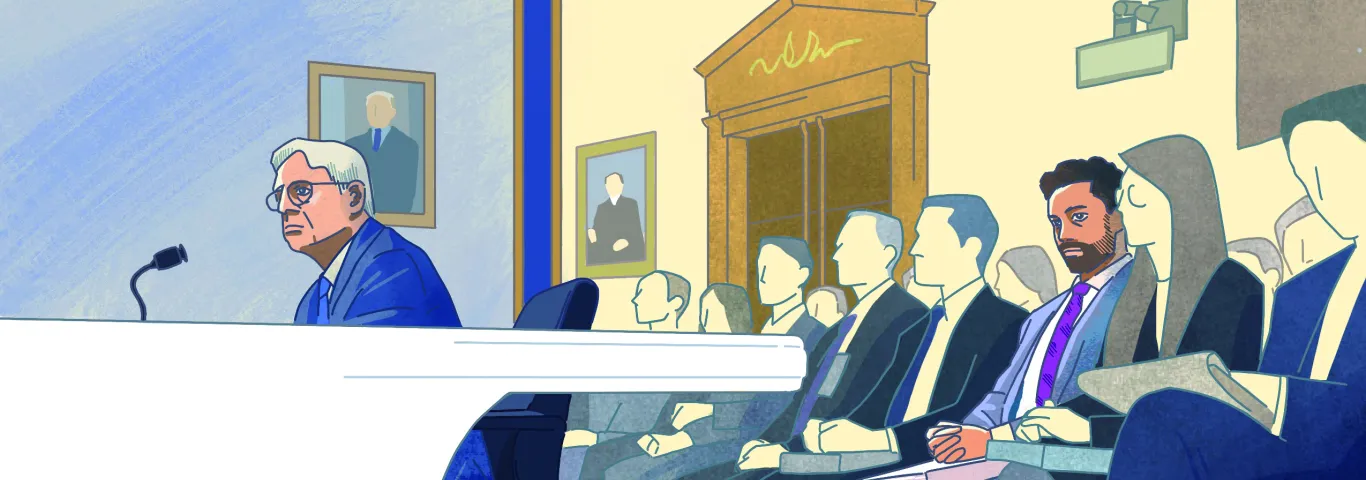
(Photo: Office of Legislative Affair)
Professor Peter Kastor was flipping through TV channels one night in 2023 when he landed on C-SPAN. Attorney General Merrick Garland was facing a grilling by members of the U.S. House of Representatives, but that wasn’t all that caught Kastor’s eye. Sitting just behind the attorney general, he saw a familiar face: one of his first WashU students, Carlos Felipe Uriarte, BA '02.
“I’d always seen those nameless faces behind cabinet officers, but I’d never known any of them, so I was delighted to see Carlos but not at all surprised,” said Kastor, the Samuel K. Eddy Professor. “From day one, Carlos was extraordinarily talented.”
As assistant attorney general for the U.S. Department of Justice’s Office of Legislative Affairs, Uriarte stands between Congress and the nation’s top law enforcement agency and serves as the DOJ’s liaison to Capitol Hill. It’s a position that’s offered the 44-year-old a front-row seat to some of the most important political and legal moments in recent history.
Uriarte spent his early years on the West Coast, the child of Ecuadorian and Salvadoran immigrants. “I grew up without any lawyers in my family," he said. “I didn’t know what a legal career could look like beyond what I saw on TV.”
Living in eastern Washington state, Uriarte didn’t see many people who looked like him. “It led to a set of complex feelings, including shame, about my identity,” he said. “At WashU, I found others to relate to through the lens of identity, including many who celebrated it.”

When Uriarte arrived on campus as an undergraduate, he discovered a place where he could imagine new possibilities. He was attracted to WashU’s reputation as a research institution with distinguished faculty, as well as its smaller class sizes and the promise of a more personalized experience. He went on to double major in economics and American culture studies.
Inspired by the John B. Ervin Scholars Program, which provides support and mentorship for Black students at WashU, Uriarte pushed for a similar program for Latino students. His efforts helped lead to the creation of the Annika Rodriguez Scholars Program in 1999. “I wanted to make sure Latino students at WashU were provided the same sense of community the Ervin Scholars offered. Through the Rodriguez Program, I could contribute not only in ways that I had benefited from when arriving at WashU but also in ways I wish had existed more when I arrived on campus.”
In 2005, the Rodriguez and Ervin programs changed their admissions criteria, opening the door to any student with a demonstrated commitment to bringing together different cultures. For 25 years, the Rodriguez Scholars program has successfully supported more than 500 students, uniting diverse groups and celebrating cultural identity.
Uriarte said this focus on diversity and inclusion continues to guide him at the DOJ. “Diversity makes our office stronger,” he said. “When people around the table hold different perspectives, we are assured to arrive at the best possible outcome.”
Uriarte’s time at WashU helped him develop other critical skills, too. As his academic advisor, Kastor challenged Uriarte to reach for creative solutions. He credits Kastor’s mentorship and WashU’s interdisciplinary courses with helping him learn how to solve some of the most challenging problems facing the country. “So much of what I am expected to do at the DOJ is to look around corners and see problems before they occur,” he said. “The ability to think about a question in a multi-dimensional way is probably the most important skill I learned at WashU.”
Still, the path from WashU to assistant attorney general wasn’t straightforward. Before his Senate confirmation in 2022, Uriarte held appointments in the DOJ and the Department of the Interior, and he served as counsel on congressional committees, including the House Select Subcommittee on the Coronavirus Crisis. He also worked in the private sector as a vice president at Capital One and the technology firm Unite Us.
When he was sworn in as assistant attorney general for the Office of Legislative Affairs, Uriarte leaned on the strength and inspiration he’d gathered working for other trailblazing government officials, including U.S. Reps. Judy Chu and Jim Clyburn, former Deputy Attorney General Sally Yates, and former U.S. Rep. Elijah Cummings. “When I saw how they were able to chart their paths, it gave me the confidence to chase my ambitions and, as Mr. Cummings put it, ‘Find out what feeds your soul.’”

During a visit to WashU last spring, Uriarte met with a group of current Rodriguez Scholars and shared how he overcame personal and professional obstacles. “There were times when I would question whether I was following the unwritten rules,” he said. “Being the only person of color and LGBTQIA+ person in a particular space, you question yourself.”
Uriarte recalled an early experience at the DOJ when he was invited to a meeting with the attorney general. He entered the room and chose a seat at the back, assuming the front seats were reserved for key people. He was quickly told there would be just six attendees — it would not do to sit in the back. Uriarte found the moment both humbling and instructive, he told the gathered students. “I realized that I should learn from that. I should embrace the opportunity to make space for myself, even in those hallowed halls.”

